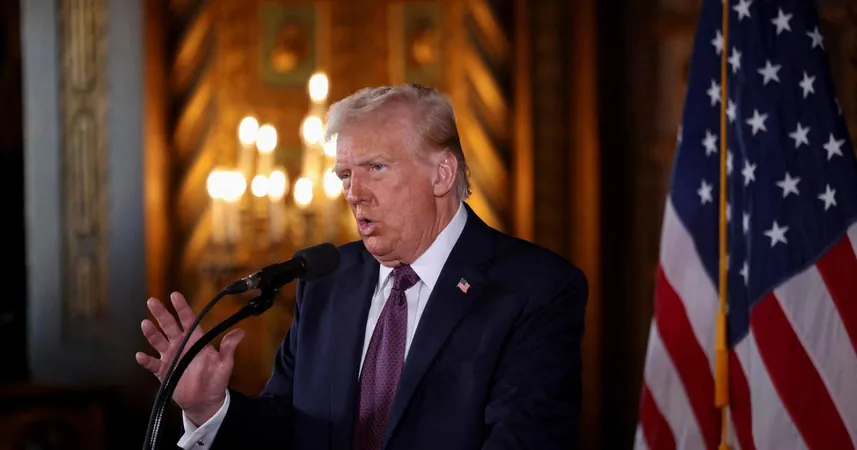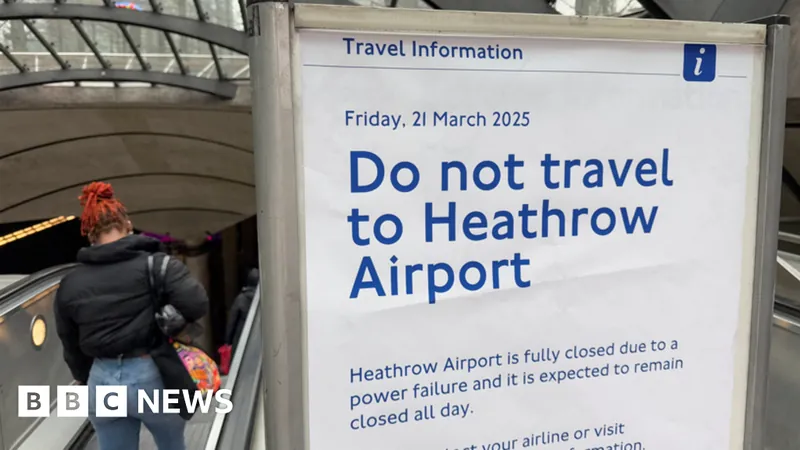
Trump's Economic Promises: Populist Aspirations Clash with Republican Pragmatism
2025-01-14
Author: Ting
Tensions Rising Within the Republican Party
Tensions are rising within the Republican Party as the divide between the self-proclaimed America-First populists and their more tech-savvy conservative counterparts becomes increasingly pronounced. This internal struggle reflects the broader ideological battle within Trump's MAGA movement, with influencers like Steve Bannon advocating for a populist agenda while tech moguls like Elon Musk promote a more progressive, innovation-driven approach.
The H-1B Visa Controversy
The initial point of contention emerged recently over the contentious issue of H-1B visas for skilled foreign workers. Bannon and right-wing activist Laura Loomer criticized Musk and others who support these visas, suggesting that they benefit financially from importing cheaper labor at the cost of American workers. In contrast, proponents like Musk and fellow entrepreneur Vivek Ramaswamy argue that these visas are crucial for attracting highly educated individuals who can propel the U.S. economy forward.
Trump's Support for H-1B Visas
In a notable pivot, Trump publicly endorsed the value of H-1B visas, a stark departure from his previous position during the 2016 campaign. However, this endorsement did little to quell the simmering hostilities. Bannon retaliated by expressing intentions to limit Musk’s influence in the Trump administration, branding him an 'evil' force.
The Republican Party's Economic Direction
Despite the personal hostilities between Bannon and Musk, larger questions about the Republican Party's economic direction linger. Bannon's push for a worker-friendly philosophy offers a pivotal opportunity for the party to either embrace a populist ethos or backtrack and cater to corporate interests.
Key Proposals Under Trump's Campaign
One of the key proposals under Trump's campaign includes the elimination of taxes on tips. Several Republican lawmakers have signaled a willingness to support this idea, provided there are safeguards to ensure it benefits low-income workers. Rep. Nicole Malliotakis (R-N.Y.) emphasized the need to clearly define what constitutes a 'tipped worker' to prevent exploitation of the system.
Tax Cuts and Child Tax Credits
Other Republicans express a growing consensus around extending the significant tax cuts achieved in Trump's 2017 Tax Cuts and Jobs Act. Such extensions could provide notable relief to working-class families, with Rep. Buddy Carter (R-Ga.) highlighting that failing to extend these cuts would result in an average tax hike of $1,500 for Georgia families earning approximately $75,000 annually.
Both sides of the aisle have shown increased interest in extending child tax credits, with some Republicans, including Vice President-elect JD Vance, proposing to raise the credit to $5,000 as a bid to win over working-class voters during the 2024 campaign.
Senator Josh Hawley (R-Mo.), who has found common ground with more progressive figures such as Elizabeth Warren on issues like sprawling pharmaceutical costs and executive compensation, believes that raising the child tax credit is a prime way to support working families. While he acknowledges that proposals for higher taxes on the wealthy might be politically challenging, he remains focused on delivering meaningful tax relief to those who are often overlooked.
Conclusion: The Future of the Republican Party
As the 2024 election draws closer, how the Republican Party navigates this internal rift—and balances the needs of the working class against the interests of larger corporations—will be crucial in determining its electoral strategy and message. The million-dollar question remains: Can Trump unify these competing factions within his base, or will this divide cost him crucial support moving forward?





 Brasil (PT)
Brasil (PT)
 Canada (EN)
Canada (EN)
 Chile (ES)
Chile (ES)
 Česko (CS)
Česko (CS)
 대한민국 (KO)
대한민국 (KO)
 España (ES)
España (ES)
 France (FR)
France (FR)
 Hong Kong (EN)
Hong Kong (EN)
 Italia (IT)
Italia (IT)
 日本 (JA)
日本 (JA)
 Magyarország (HU)
Magyarország (HU)
 Norge (NO)
Norge (NO)
 Polska (PL)
Polska (PL)
 Schweiz (DE)
Schweiz (DE)
 Singapore (EN)
Singapore (EN)
 Sverige (SV)
Sverige (SV)
 Suomi (FI)
Suomi (FI)
 Türkiye (TR)
Türkiye (TR)
 الإمارات العربية المتحدة (AR)
الإمارات العربية المتحدة (AR)